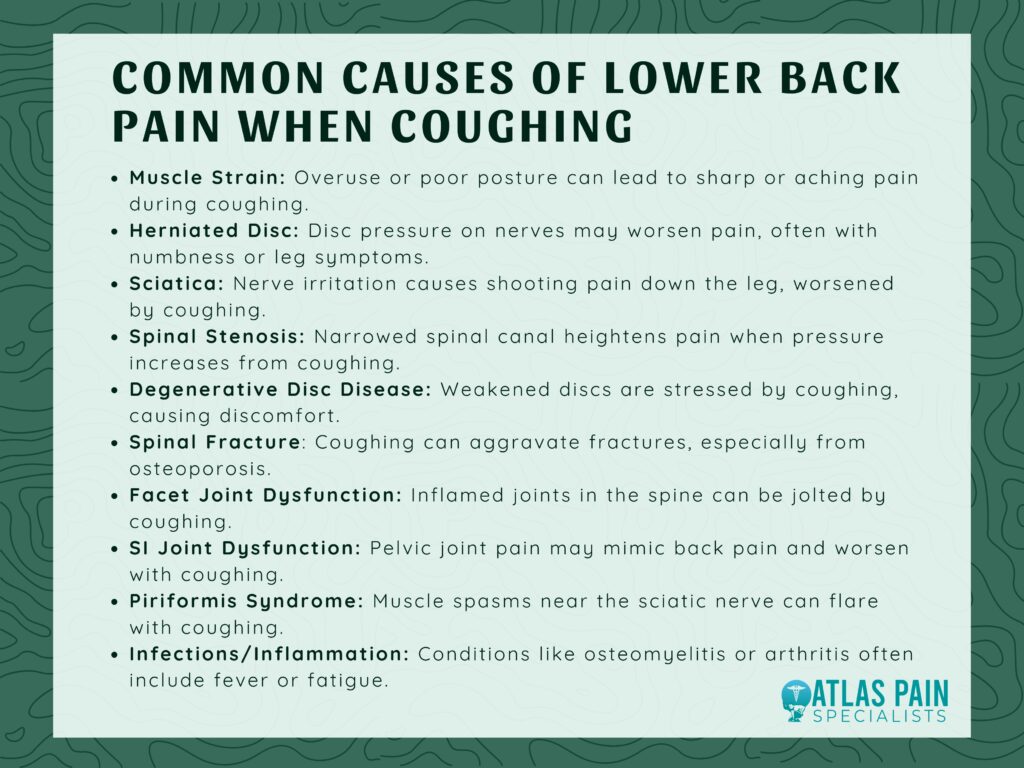

Lower Back Hurts When I Cough
Feeling a sharp twinge or ache in your lower back every time you cough can be both frustrating and concerning. While it might seem like a minor annoyance, this pain can sometimes signal an underlying issue involving your muscles, spine, or nerves. Understanding why this happens is the first step toward finding effective relief and preventing it from becoming a chronic problem.
This article explains the link between coughing and lower back pain, covering common causes of when to seek medical help and effective treatment options. It also includes prevention tips to help keep your back healthy and pain-free.
Coughing and Lower Back Pain
Coughing raises abdominal and spinal pressure, straining muscles and ligaments, and worsening conditions like herniated discs or sciatica. This can cause lower back pain, especially with pre-existing weakness, inflammation, or nerve involvement.
The force of a cough can also misalign the spine, causing discomfort. Sharp, radiating pain, or persistent pain warrants medical evaluation, as it could indicate a serious issue like spinal stenosis or nerve compression. Early diagnosis prevents further injury and guides treatment.
Potential Causes of Lower Back Pain with Coughing
Lower back pain that intensifies during coughing can range from mild muscle issues to more serious spinal conditions. Below are several potential causes that explain why this happens and what might be going on in your body.,

| Symptom | Possible Concern | Suggested Action |
|---|---|---|
| Sharp pain when coughing | Muscle strain, herniated disc | Try ice/heat and rest |
| Pain down leg with coughing | Sciatica | See a doctor for evaluation |
| Numbness or tingling | Nerve involvement | Seek medical attention |
| Pain + fever or night sweats | Infection | Urgent medical evaluation |
| No pain when not coughing | Strain-related | Conservative treatment at home |
1. Muscle Strain or Sprain
Coughing puts pressure on your abdominal and back muscles, and if these muscles are already strained, it can cause sharp or aching pain. This is often due to overuse, poor posture, or improper lifting techniques.
2. Herniated Disc
A herniated disc can press on nearby nerves, causing pain that worsens with movement or pressure — including coughing. This condition often leads to symptoms like numbness, tingling, or pain radiating down the leg.
3. Sciatica
Sciatica occurs when the sciatic nerve becomes irritated, usually due to a herniated disc or spinal misalignment. Coughing can worsen this nerve irritation, causing shooting pain down the lower back and leg.
4. Spinal Stenosis
In spinal stenosis, the spinal canal narrows and compresses the spinal cord or nerves. Coughing can increase pressure in the spinal canal, making the pain more pronounced, especially in standing or walking.
5. Degenerative Disc Disease
This age-related condition causes discs to wear down over time, leading to stiffness and instability in the spine. Increased abdominal pressure from coughing can stress these weakened discs and trigger pain.
6. Spinal Fracture or Trauma
A compression fracture in the spine, often caused by osteoporosis or injury, can become aggravated by coughing. The pain tends to be sharp and localized and may worsen with even minor movements.
7. Facet Joint Dysfunction
The facet joints connect the vertebrae in your spine and allow for movement. If these joints are inflamed or misaligned, coughing can jolt them and cause localized back pain.
8. Sacroiliac (SI) Joint Dysfunction
The SI joints link the spine to the pelvis. Dysfunction here can mimic lower back pain and may worsen with actions like coughing, sneezing, or changing positions.
9. Piriformis Syndrome
Although less common, tightness or spasms in the piriformis muscle (near the buttocks) can irritate the sciatic nerve. This may cause pain that starts in the lower back and intensifies when coughing or sitting.
10. Infections or Inflammatory Conditions
Conditions such as osteomyelitis (spinal infection) or ankylosing spondylitis (an inflammatory disease) can cause persistent lower back pain. These are often accompanied by other symptoms like fever, fatigue, or stiffness that worsens in the morning.
If you frequently feel lower back pain when coughing, it’s a signal your body shouldn’t be ignored. Getting a proper diagnosis can help you take the right steps toward relief and prevent long-term damage.
When to Seek Medical Attention
Sometimes, lower back pain during coughing is harmless and temporary, but in certain cases, it can signal a more serious underlying condition. Knowing when to seek medical attention can help you prevent complications and get the right treatment early.
| Symptom | What It May Indicate |
|---|---|
| Pain lasting more than 2–3 weeks | Chronic or degenerative spinal issue |
| Pain radiating to legs or buttocks | Sciatica or nerve compression |
| Numbness, tingling, or weakness | Nerve damage or disc-related problems |
| Loss of bladder or bowel control | Emergency: Possible cauda equina syndrome |
| Recent trauma or osteoporosis | Possible spinal fracture |
| Fever or unexplained weight loss | Infection or systemic illness |
1. Pain That Lasts More Than a Few Weeks - If back pain persists for more than two to three weeks despite home care, it could signal a deeper issue like a herniated disc or degenerative condition that requires medical attention.
2. Pain Radiating Down the Legs - Pain radiating from your lower back into the legs may indicate nerve compression, like sciatica, which often requires imaging or specialist care.
3. Numbness, Tingling, or Weakness - Numbness, tingling, or weakness in the legs or feet could signal nerve damage or compression, which needs to be addressed to prevent permanent damage.
4. Loss of Bladder or Bowel Control - Sudden difficulty controlling bladder or bowel functions is a red flag for cauda equina syndrome and requires immediate medical attention.
5. History of Trauma or Osteoporosis - If back pain follows a fall, accident, or is linked to osteoporosis, a spinal fracture could be the cause and warrants a medical exam.
6. Fever or Unexplained Weight Loss - Back pain accompanied by fever, night sweats, or unexplained weight loss could indicate infection or other serious conditions that need prompt investigation.
Don’t ignore your body’s warning signs — if any of these symptoms accompany your lower back pain, especially when coughing, it's best to consult a healthcare professional. Early diagnosis leads to better outcomes and faster relief.
How to Find Relief: Treatment and Home Remedies
If your lower back hurts when you cough, there are several effective ways to relieve the discomfort, depending on the cause. While some cases may require medical treatment, many people find relief through simple home remedies and conservative care.
1. Rest and Activity Modification
Give your back time to heal by avoiding activities that worsen the pain, such as heavy lifting or prolonged sitting. However, complete bed rest isn't recommended—gentle movement can promote circulation and aid recovery.
2. Apply Ice or Heat
Using an ice pack during the first 48 hours can reduce inflammation and numb sharp pain. After that, switching to a heating pad can relax muscles, improve blood flow, and ease stiffness.
3. Over-the-Counter Medications
Nonsteroidal anti-inflammatory drugs (NSAIDs) like ibuprofen or naproxen can reduce both pain and inflammation. Always follow dosage instructions and consult your doctor if you have any underlying conditions.
4. Gentle Stretching and Strengthening Exercises
Simple exercises like pelvic tilts, cat-cow stretches, or hamstring stretches can ease tension in the lower back. Strengthening your core muscles also supports spinal stability and prevents future flare-ups.
5. Maintain Good Posture
Poor posture can strain your lower back and aggravate pain during a cough. Use ergonomic chairs, avoid slouching, and make sure your workspace supports a neutral spine position.
6. Physical Therapy
A physical therapist can create a customized exercise and stretching plan tailored to your specific condition. Therapy often includes manual techniques, posture training, and core strengthening to relieve pain and improve function.
7. Supportive Bracing
In some cases, a lumbar brace can provide temporary support and reduce strain on the lower back during recovery. However, it's important to use it only as recommended to avoid weakening your muscles.
8. Alternative Therapies
Techniques such as chiropractic adjustments, acupuncture, or massage therapy may help relieve tension and restore alignment. These therapies can be effective when used alongside conventional treatments.
Relieving lower back pain when coughing often requires a mix of rest, proper care, and movement. If symptoms persist or worsen, don't hesitate to reach out to a healthcare provider for a more targeted approach.
Prevention Tips: How to Keep Your Back Healthy
Preventing lower back pain doesn’t require a complete lifestyle overhaul, but it does involve consistency in how you move, rest, and care for your body. These tips can help protect your spine and minimize the risk of injury or strain, even during common activities like coughing or sneezing.
| Tip | Why It’s Important |
|---|---|
| Maintain proper posture | Reduces spinal stress during daily activities |
| Exercise regularly | Strengthens core and back muscles for better support |
| Lift with correct form | Prevents strain and disc injury |
| Keep a healthy weight | Lessens pressure on lower back and joints |
| Use ergonomic furniture | Promotes spinal alignment during work or rest |
| Stretch and strengthen core | Increases resilience to strain during movement or coughing |
| Quit smoking | Improves disc health and blood flow |
| Stay hydrated | Keeps spinal discs healthy and cushioned |
| Sleep with proper support | Reduces overnight strain and promotes healing |
| Wear supportive footwear | Helps maintain proper posture and spinal alignment |
| Avoid long periods of inactivity | Movement keeps muscles flexible and joints lubricated |
| Manage stress | Reduces muscle tension and improves overall health |
1. Maintain Proper Posture - Stand tall and sit with your feet flat and spine supported to reduce back stress.
2. Exercise Regularly - Strengthen your core and lower back with regular exercises to improve stability and reduce injury risk.
3. Lift with Care - Lift with your legs, not your back, and avoid twisting when carrying heavy objects.
4. Maintain a Healthy Weight - A balanced diet and active lifestyle help reduce spinal pressure caused by excess weight.
5. Use Ergonomic Furniture - Choose chairs with lumbar support and position screens at eye level to improve posture.
6. Stretch and Strengthen Core Muscles - Strengthen your core and increase flexibility with exercises like planks and yoga.
7. Quit Smoking - Smoking weakens spinal discs and increases the risk of back injuries.
8. Stay Hydrated - Hydration keeps spinal discs flexible and prevents stiffness.
9.Sleep in a Spine-Friendly Position - Sleep with proper support to keep your spine aligned and prevent strain.
10. Wear Supportive Footwear - Choose shoes with good arch support to reduce strain on your back.
11. Avoid Prolonged Sitting or Standing - Take breaks every 30–60 minutes to stretch or change positions.
12. Manage Stress - Practice stress-relieving activities like deep breathing or exercise to prevent muscle tension.
By consistently applying these back-friendly habits, you can significantly reduce your risk of developing lower back pain — even during physically demanding or everyday tasks like coughing. Prevention is a long-term investment in your mobility, comfort, and overall well-being.
Conclusion
In conclusion, while lower back pain triggered by coughing can often be managed with simple treatments and self-care, it’s important to pay attention to the severity and duration of the discomfort. If the pain persists or worsens, seeking medical advice is crucial to address any underlying conditions.
By understanding the causes, seeking appropriate treatment, and adopting preventative measures, you can keep your back healthy and reduce the risk of further pain.
About Dr. Sean Ormond



